AMABHUNGANE
State Capture: The case against Nedbank

In the saga of disgraced financial services firm Regiments Capital, one name keeps popping up: Nedbank. After years of digging, we can disclose that the bank incentivised the firm to peddle its financial products to public sector clients that Regiments was supposed to advise impartially. Together, they raked in hundreds of millions.
Mathane Makgatho was tired. She had spent two years being gaslit by senior executives at Transnet who tried to ram questionable transactions down her throat. As treasurer of the state rail company, she had stood her ground. But here, once again, was Regiments Capital offering a deal that her years of experience told her was simply implausible.
She had reason to be suspicious.
A year earlier, Transnet’s chief financial officer, Anoj Singh, had handed her a proposal from Regiments for a R5-billion Nedbank loan and told her to sign it “today”. But when she read it, alarm bells went off.
Instead of a direct loan from Nedbank, the deal was to be channeled through an intermediary company which would collect interest on behalf of Nedbank, a convoluted arrangement that would cost Transnet R750-million more than was necessary.
The proposal was so alarming that she had gone straight to Transnet chief executive Brian Molefe: “I was irate… I explicitly told him that should we approve the structure, we will go to jail for stealing money,” she later told the Zondo Commission.
That 2013 deal had disappeared, but Regiments had not. And now, in July 2014, she was again being asked to sign off on a Regiments proposal involving Nedbank that made her deeply uncomfortable because she felt it was so obviously mispriced.
As far as Makgatho could tell, what was fuelling the pipeline of questionable deals landing on her desk was the rather too close relationship between Regiments director Eric Wood and Nedbank’s head of credit and international derivatives, Moss Brickman.
Makgatho told the commission that she was so appalled by Wood and Brickman’s latest gambit that she asked the bank to “lodge a complaint” with Nedbank Capital, the division where Brickman worked.
“I was not happy [with] what … I thought it was an improper relationship… Regiments will come with certain proposals … and at the back of those proposals there was always one common bank and that was Nedbank.”
Makgatho resigned soon after, in early 2015, but she had put her finger on a question amaBhungane had been asking for years: Why was it always Nedbank?
To access all the documents used in this investigation, go to amaBhungane’s evidence docket here.
In brief: The case against Nedbank
Wherever we followed Regiments on its destructive path through state-owned entities and municipalities, we kept seeing Nedbank offering loans, complex financial products called interest rate swaps, and millions of rands in hidden commissions.
The case we will outline in the pages that follow is this:
For years, Regiments persuaded its clients – public entities who paid and trusted it for independent advice – to take up financial products, often provided by Nedbank. But Regiments’ advice was tainted by the promise of massive additional fees.
If the client agreed to take up loans or interest rate swaps, Regiments got millions from the bank; if the client did not, Regiments got only its standard advisory fee from the client.
This was initially set out in a “highly confidential” commission agreement which saw Nedbank pay millions in “introduction fees” for each new deal Regiments brought to the bank. Later, Nedbank agreed to act as postman, delivering millions of rands of public money to the controversial firm, with the blessing of Regiments’ public sector clients.
By our calculation, Regiments was able to generate at least R95-million in fees from Nedbank via these two methods, plus another R120-million from a set of Transnet transactions where the fees once again flowed via Nedbank but without, the bank claims, its knowledge.
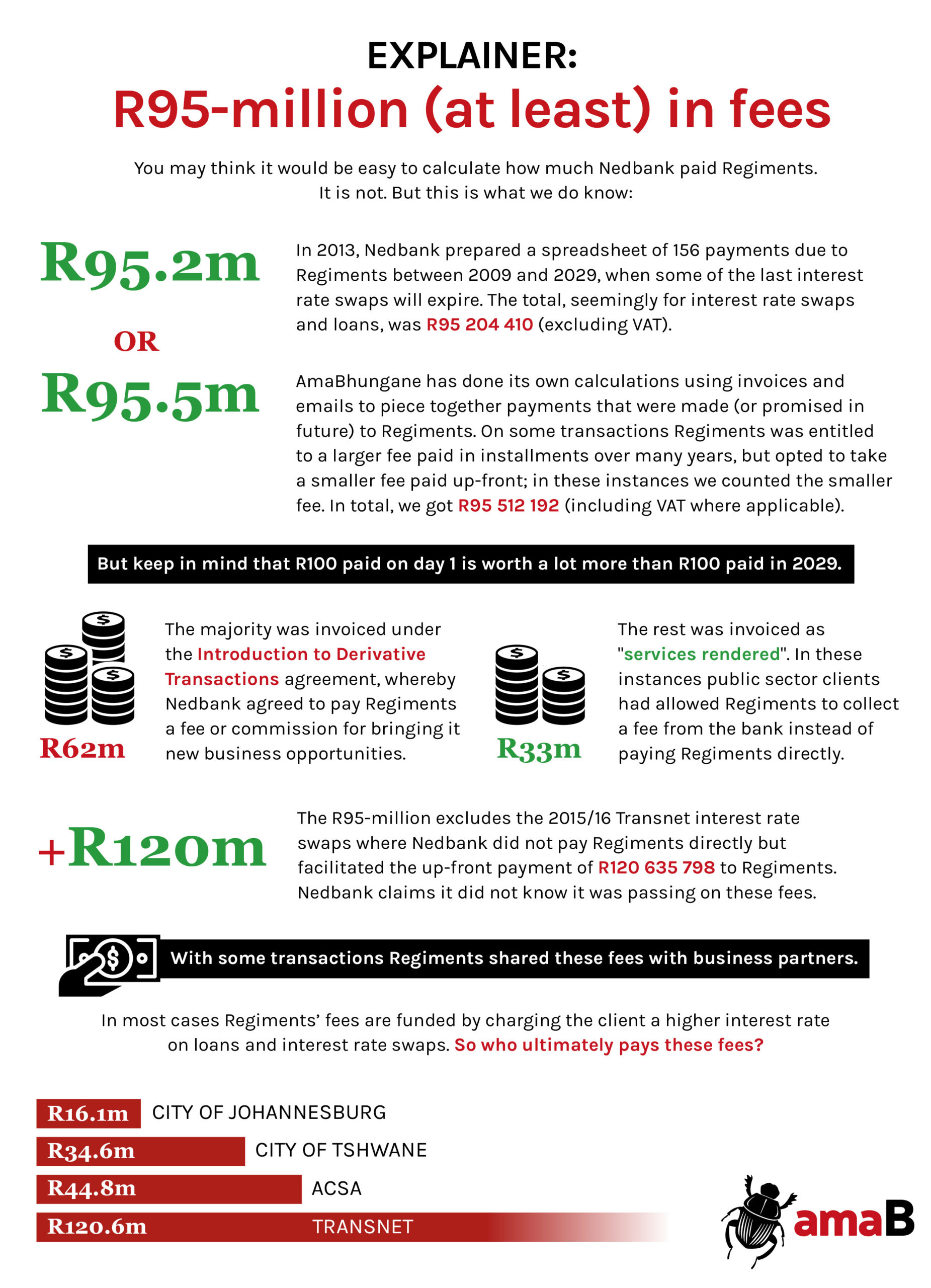
The additional fees incentivised Regiments to propose deals that were not always in the best interests of its clients – state-owned entities and municipalities.
Nedbank ignored the obvious conflict of interest because Regiments promised that the fees were always disclosed to its clients, but the evidence shows that Nedbank knew or ought to have known this was not true – and that Regiments was abusing its influence with public officials.
Over the years Regiments brought Nedbank deals running into billions, and the promise of additional fees in turn encouraged Regiments to propose a dizzying array of interest rate swaps. But some of these high-risk transactions proved disastrous for the clients, who lost billions.
To understand the scheme – and the troubling partnership between Regiments and Nedbank – we need to go back to 2009, and follow a trail that leads through four Regiments clients: The City of Johannesburg, the City of Tshwane, Airports Company South Africa (Acsa) and, finally, Transnet.
In putting together this story we reviewed hundreds of internal emails, numerous confidential reports and affidavits.
We sent detailed questions to Regiments’ directors. Two ignored us; one declined to comment. Regiments previously defended its actions, saying what it did was “common market practice”.
We also conducted two on-the-record interviews with Nedbank in 2018. As further evidence emerged, both through our own investigations and via testimony at Zondo, Nedbank became far less forthcoming.
When we approached Nedbank again last year, it was no longer willing to provide information it had previously committed to share. We sent a 35-page letter setting out the evidence we had and the conclusions we were likely to draw, but the bank did not respond in detail, instead saying in a statement:
“[W]e have previously met with you with the sole intention of providing you with the correct context and factual scenario and were open and honest in responding to your questions.”
The proposed article “does not contain anything new besides what we believe are unsubstantiated conclusions drawn by you…
“Nedbank has at no time acted unlawfully, or improperly in its dealings with Regiments and the affected counterparties… Nedbank denies any inference or accusation that Nedbank was complicit in any alleged scheme by Regiments to defraud its clients. Nedbank also rejects any suggestion that it ignored ‘red flags’ relating to the conduct of Regiments.” (Read Nedbank’s full statement.)
Here is the evidence which, in our view, says otherwise.
The ‘highly confidential’ agreement
The contract was barely five pages long. Signed in May 2009, and dubbed Introduction of Derivative Transactions, it promised Regiments a fee for bringing new business to Nedbank.
The existence of this contract remained a secret for seven years, until 2016 when lawyers for one of Regiments’ clients uncovered millions in undisclosed fees.
In an emailed response, Regiments director Niven Pillay showed the lawyers this “highly confidential” document but warned the contract should not be shared with anyone “without our express permission”.
“Regiments Advisory [has] been referring business and earning its fees from the banks”, Pillay wrote, assuring the lawyers that this was a “common market practice”.
And although the phrase “introduction fee” was changed to “fee” in the final version of the contract, the principle remained the same: if Regiments brought Nedbank new business, it would get a cut.
Introduction fees are not uncommon but they are a rich vein for corruption.
As a result, the Financial Advisory and Intermediary Services Act and its code of conduct are clear that an adviser like Regiments has to disclose “any incentive … commission, fee” it is getting on the side. This is not idle legalese, but a very real protection for clients, who need to know that their interests and not those of third parties are being served.
AmaBhungane was able to access a batch of correspondence between Regiments and Nedbank, including drafts of the Introduction of Derivative Transactions agreement. A close study of the “track changes” shows that Regiments director Eric Wood tried to delete the clause that said Regiments had to tell its clients that it was getting a sweetener from the bank.
The clause was reinserted into the agreement after Brickman, Wood’s contact at the bank, reported that Nedbank’s compliance department “is adamant that a clause relating to the disclosure to the client be included”.
This episode should have set off alarm bells at Nedbank. Regiments’ clients were almost always in the public sector and generally Regiments had been hired (and paid a fee) by them to advise them on complex financial transactions. If Regiments was being offered an extra fee on the side, those public sector clients had a right to know.
When we interviewed Nedbank in 2018, Anél Bosman, then managing executive of corporate and investment banking, tried to downplay Regiments’ reluctance to include a disclosure clause: “[W]hether that clause was included or not was an additional measure that the bank took because we wanted the right to ask for it for our own records. But Regiments at all times, being regulated by the [Financial Services Board], had that responsibility in any way.”

The final agreement, signed in May 2009, confirmed that “Regiments undertakes to disclose to the Client” that Regiments would receive a fee from Nedbank and added that “Regiments will provide Nedbank Capital with written proof of such disclosure when requested”.
In a number of cases, the only written “proof” Regiments provided was a one-line disclaimer added at the bottom of its invoices to Nedbank: “Regiments Capital (Pty) Ltd has informed its client that it is earning a fee for the facilitation of the above transaction.”
But had it?
Naked swaps and hidden commissions
One of the first deals that Regiments brought to Nedbank under the Introduction of Derivative Transactions agreement was an interest rate swap with one of Regiments’ most loyal clients: the City of Johannesburg.
In 2009 the city found itself in trouble. It had entered into a series of interest rate swaps to balance out the risk of various loans. But the loans had been paid off early, leaving the city holding “naked” swaps, a speculative position that did not sit well with the auditor-general, who instructed the city to get the swaps off its books.
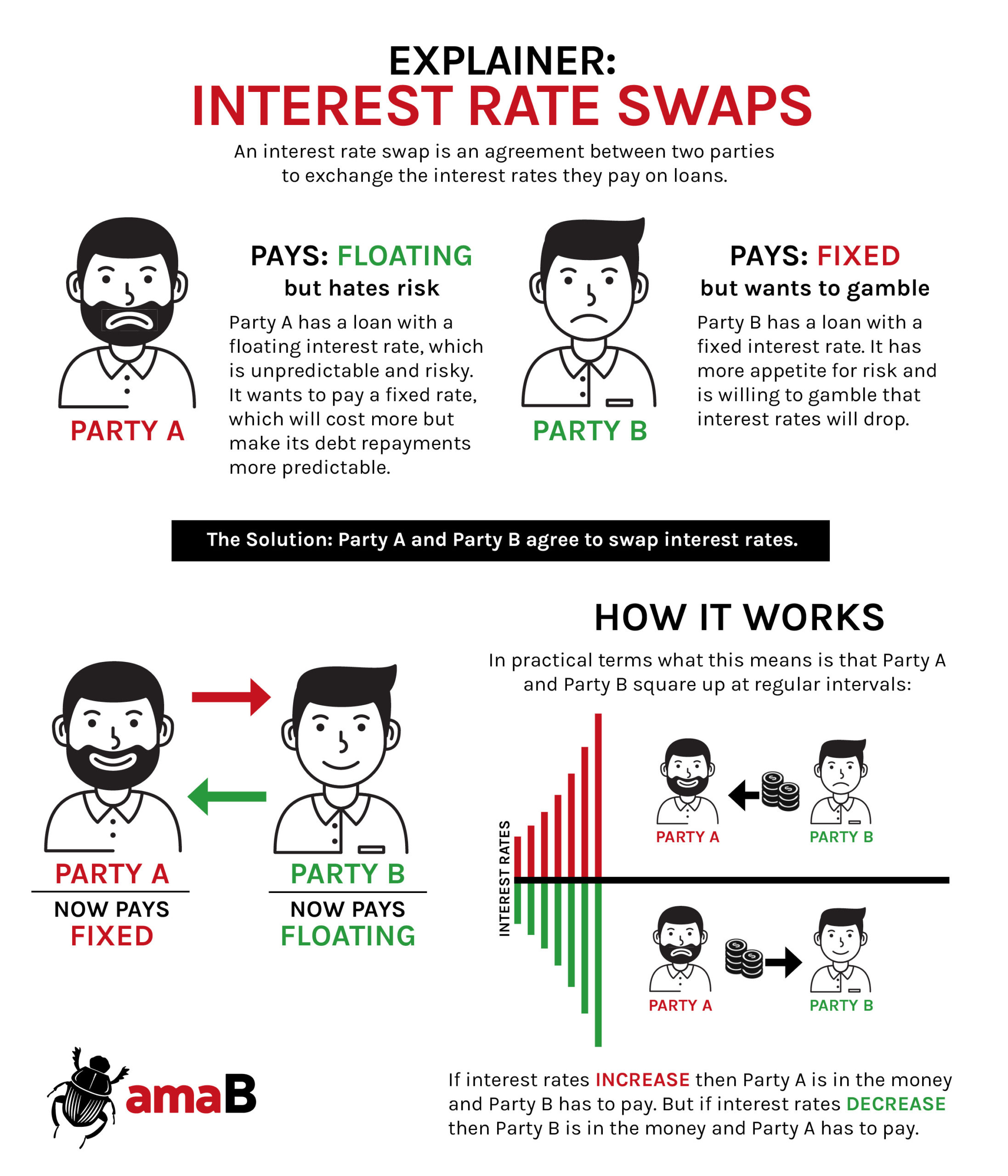
There were several ways the city could do this: the simplest was to unwind the swaps with Standard Bank and RMB, the counterparties who sat on the other side of the swaps.
Instead, Regiments’ Wood and Pillay proposed the city enter into a convoluted, two-step transaction: the city would cede the swaps to its sinking fund which would then pay Nedbank to take over the swaps. The sinking fund (a pool of money set aside for paying long-term debts) was conveniently managed by a subsidiary of Regiments.
The transaction would cost R12-million, the two Regiments directors told city treasurer William Mathamela. The city would have to pay Nedbank R11-million to take over the swaps, which they assured him was the going market rate, plus modest costs of R1-million.
Mathamela approved the proposal on his last day in office. He would resurface a few months later as Regiments’ business partner, but in a written response denied that this played any part in approving the transaction. (Read his detailed response.)
William Mathamela’s Det… by DocumentsZA
But, unbeknown to the city, Regiments had struck a backroom deal with Nedbank.
The details are spelled out in emails between Wood, Brickman and another Nedbank employee, Mario Visnenza: The bank would take over the swaps and be paid the going “mid-market” rate of R5.2-million; it would take another R750,000 to cover its costs and R2-million as profit.
These costs would be deducted from the R12-million that the city had blindly agreed to pay; what was left – more than R4-million – Nedbank would pay Regiments as “fee” for bringing it the business.
Technically, there were two divisions of Regiments involved in this scheme: Regiments Capital was advising the city on how to manage the swaps while a subsidiary, Regiments Fund Managers, offered the dubious solution. But both were represented by Wood. And Wood (the adviser) was not about to tell the city that Wood (the fund manager) was lying about the cost of the transaction.
Yet, when Regiments delivered its invoice to Nedbank – issued under the Introduction of Derivative Transactions agreement – it confirmed that “Regiments Capital (Pty) Ltd has informed its client that it is earning a fee for the facilitation of the above transaction”.
That seems unlikely.
Emails show that both city officials and KPMG, which had been appointed by the auditor-general, asked Regiments for a breakdown of the R12-million, including “all documentation/justification that you may have received from Nedbank for the costs relating to the unwinding of the COJ swaps”. But Regiments failed to mention that more than R4-million of that figure would go to pay its commission.
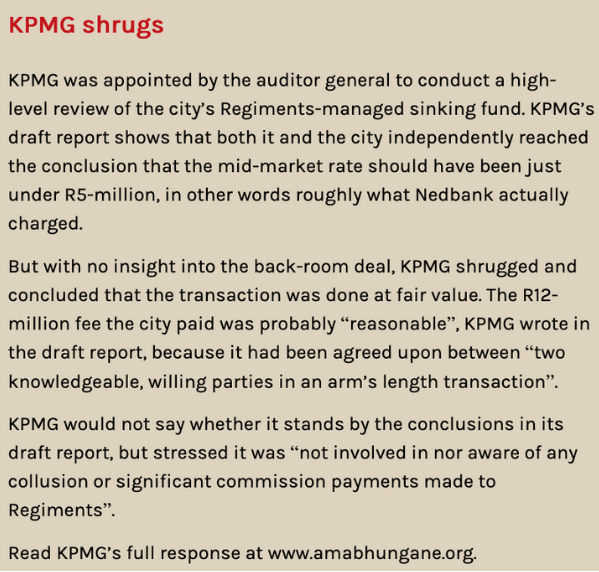
Read full response here.
A city spokesperson told us: “The City was at no point made aware by Regiments and/or Nedbank of the ‘Introduction of Derivative Transactions’ … and of the fees paid to Regiments”.
Nedbank, of course, knew that Regiments was crawling all over the transaction, creating conflicts at every turn. It also knew that R12-million was excessive and that the fat from the deal would end up in Regiments’ bank account.
Nedbank’s Visnenza even had a copy of the “confidential” proposal where Regiments fund managers lied to the city about the mid-market rate. But instead of warning the city that it was being misled, the bank chose to participate in the scheme.
Brickman refused to speak to us. “I have long since retired from Nedbank and have no comment to add,” he said via WhatsApp, his profile picture showing him giving the camera the middle finger.
Visnenza, who still works for Nedbank, asked that we direct all our questions to Nedbank.
Importantly, Nedbank has never tried to distance itself from Brickman or Visnenza’s actions.
During our 2018 interviews, Bosman (who was Brickman’s boss) and Nedbank Corporate and Investment Bank head Brian Kennedy (who was Bosman’s) repeatedly struggled to answer questions or told us that they could not find the relevant emails – all while Brickman and Visnenza sat upstairs.
In its response to our 35-pages of questions last year, Nedbank said: “Nedbank confirms that it was not aware, at the time, of any unlawful or corrupt conduct by Regiments. Nedbank denies that any of its executives were complicit with reference to any unlawful or corrupt conduct that may have been perpetrated by Regiments and others.”
But Nedbank did not need second sight back in 2009 to see the red flags going up all around its new rainmaker.
The gatekeepers
“It is important to see the context,” Nedbank executives told us in 2018, when they were still speaking to us. According to Kennedy, in the mid-2000s the banks were facing an increasingly sceptical public sector, which felt that the industry was not doing enough to develop black-owned financial services firms.
“Regiments had become very active with [state-owned entities] … so we were encouraged to work with these guys… And if you don’t talk to Regiments, the [state-owned entity] swap business … is going to go somewhere else”.
He explained Nedbank’s perspective: “If you don’t deal with Regiments you’re not going to do any business with any of the state-owned entities.”
Instead of raising concerns about this gatekeeping, Nedbank entered what amounted to a pay-for-play agreement with Regiments – via the Introduction of Derivative Transactions contract.
The results were clear.
In the period that followed the Johannesburg deal, the same modus operandi would play out: Regiments would get appointed as adviser, then stretch its mandate to sell its clients loans and interest rate swaps without a competitive bidding process, claiming an additional fee from the client, an introduction fee from the bank, or both.
At the City of Johannesburg and City of Tshwane, Regiments piggy-backed on its position as trusted adviser to be appointed under “emergency” procurement rules to raise short-term finance.
Regiments arranged two short-term facilities from Nedbank – R1-billion for the City of Johannesburg in September 2009 and R700-million for the City of Tshwane the following month – and billed each municipality a capital raising fee (total: R2.7-million).
Then, under Introduction of Derivative Transactions, Regiments quietly extracted another R3.4-million in fees from Nedbank.
When the City of Tshwane refused to pay Regiments’ invoice, it was threatened with legal action. None of the lawyer’s letters we have seen mention that Regiments had already collected a fee from Nedbank.
At the City of Johannesburg, Nedbank’s short-term facility was quickly followed by two long-term loans: R1-billion in March 2010 and R315-million in April 2010.
By now, Regiments had a signed mandate from the city allowing it to claim 35 basis points (0.35%) as a capital raising fee. Emails show that Regiments claimed this fee from the city – R5.2-million in total – then turned around and billed Nedbank another R9.5-million under the secretive agreement.
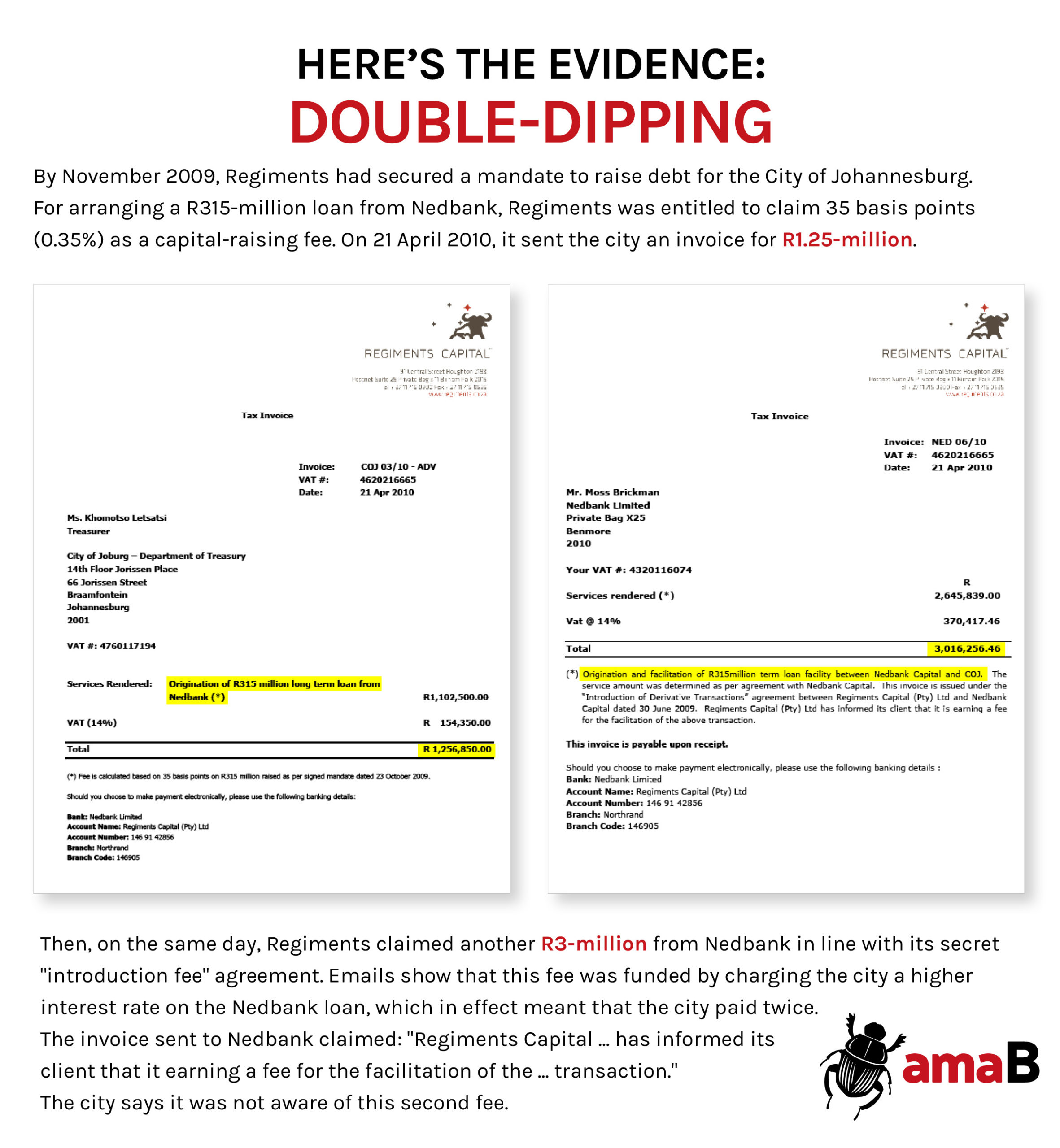
Despite the standard claim at the bottom of Regiments’ invoice to Nedbank, a city spokesperson again told amaBhungane: “The City was at no point made aware by Regiments and/or Nedbank that Regiments received a fee from Nedbank.”
Damning emails also show that on most of these transactions, Nedbank allowed Regiments to dictate the interest rate offered to the client: “We leave it up to you to negotiate a margin for us to share on the usual 50/50 agreement,” Visnenza told Wood in one of several similar emails.
In short, the higher interest rate charged to the client, the more profit Regiments and Nedbank would make.
This highlights the fundamental conflict of interest that Introduction of Derivative Transactions had formalised: Regiments was expected to provide its clients with independent, sound advice yet it was highly incentivised to sell its clients loans with higher interest rates from the bank that had promised Regiments a fee.
But arranging loans for clients was not where the real money was.
What would exponentially increase Regiments’ fees was if clients could be persuaded to start chopping and changing interest rates, supposedly to take advantage of market conditions or reduce risk.
In practice, these interest rate swaps would be lucrative for Regiments and Nedbank but could be disastrous for Regiments’ clients – as Acsa was about to discover.
The keys to the Acsa vault
The idea of selling clients not just loans but interest rate swaps had been brewing for some time.
A year before Wood added his signature to Introduction of Derivative Transactions, Regiments had been hired to help a troubled client: Acsa was facing a liquidity crunch and appointed Regiments to secure additional funding.
By early 2009, Regiments had raised R3.5-billion for Acsa from Nedbank and two other lenders, but saw an opportunity to do more.
Brainstorming sessions at Regiments and proposals followed, all focused on how to drum up more business from Acsa’s treasury department, led by a soft-spoken and little-known official: Phetolo Ramosebudi.
Ramosebudi will be familiar to amaBhungane readers: In 2018, we exposed [link The insider: Booze, bogus invoices and a Range Rover Sport] how Regiments had made suspicious payments to Ramosebudi’s companies for years.
Starting in early 2009, Regiments advised Ramosebudi and Acsa to enter into a series of interest rate swaps to take advantage of market conditions. This was bread-and-butter work that any experienced treasurer like Ramosebudi should have been able to handle without the help of consultants. But what was more alarming was the dizzying number of swaps that Regiments would ultimately execute.
On just one loan – R1.75-billion from Nedbank – Regiments advised Acsa to swap from a loan linked to the prime lending rate to one linked to the Johannesburg Interbank Average Rate or Jibar (the average rate at which banks lend each other money); from Jibar to a fixed rate; and from fixed to an agreement linked to the consumer price index (CPI). All this in less than two years.
Even the first swap – from prime to Jibar – was alarming enough for Mfundo Nkuhlu, Nedbank’s then head of corporate banking, to intervene.
Nkuhlu – who is now Nedbank chief operating officer – called a meeting where, according to Nedbank, he warned Acsa that entering into a swap so soon after taking a loan “may not be in their best interests”.
“[Nkuhlu and his team] found it unusual that shortly after we entered into a vanilla loan … that’s linked to prime, that [Acsa will] change it to something that is linked to Jibar… So they weren’t sure that Acsa actually understood … the risks inherent in that,” Gerda Ferreira, Nedbank’s executive in charge of financial crime, told us in 2018.
“[Nkuhlu] actually says that it was quite an acrimonious meeting,” Bosman told us during the same 2018 interview.
Ferreira added: “[Acsa] made it quite clear that they understand what they are doing and Regiments are their advisers and they [are] comfortable that it’s in their best interests.”
If Nedbank was suspicious that Regiments was profiting at its client’s expense, it could have walked away – or put extra checks in place.
Instead, it side-stepped any doubts and agreed to execute the transaction. For its role, Regiments was awarded 8.5 basis points (0.085%), generating an up-front fee of R9-million.
By now, Nedbank had handed Regiments a copy of the Introduction of Derivative Transactions agreement, incentivising Regiments to bring more of this kind of business to the bank.
In October 2009, Nedbank agreed to act as counterparty on a second Jibar-to-fixed swap on the same loan as well as a second smaller swap. On each, it added 10 basis points (0.1%) generating an up-front fee of R13.1-million for Regiments.

Emails show that with these swaps, as with the City of Johannesburg facilities, Nedbank allowed Regiments to dictate the interest rate Acsa would be offered: “We leave it in your good hands to negotiate a margin for us on the usual 50/50 arrangement,” Visnenza told Wood in one email.
Disclosure
By now, Nedbank’s own compliance department had identified this obvious conflict of interest and asked how exactly clients were informed of the commission Regiments received from Nedbank.
“How would you provide written proof of the disclosure… That’s what they looking for – is it minuted in a meeting?” Nedbank’s Brickman asked Wood.
Instead of answering the question, Wood assured him: “In the case where Regiments has proposed a structured solution to a client, Regiments is not part of the [client’s] decision making process.”
But the question of who knew about Regiments’ massive fees is an important one.
When we interviewed Acsa in 2018, a spokesperson told us they could find no record that Regiments had disclosed these fees to any Acsa official aside from Ramosebudi, the treasurer. This is consistent with what Regiments would later tell the banks: that the “person at client informed of Regiments fee” was Ramosebudi who was told about the fee in a phone call (“telephonic verbal”).
Asked by the Zondo Commission if he was aware that Regiments was extracting these massive fees and that Acsa would ultimately pay those fees through a higher interest rate, Ramosebudi said: “I would not have known the quantum but I would have known that Acsa would pay a fee for structuring of the swap.”
Alarmed, the evidence leader asked: “But that fee could have been … R50-million. Would you not have taken steps to find out how much you were committing your organisation to pay back?”
Ramosebudi’s response was that he looked at the all-in rate Nedbank offered. If it looked fair, that was what mattered.
Financial weapons of mass destruction
With hindsight, it is easy to say that a particular swap was a bad idea. Swaps are essentially a gamble on what interest rates will do in future; get it wrong and a few basis points can become what Warren Buffett called “financial weapons of mass destruction”.
In March 2010, Regiments advised Ramosebudi to enter into a new kind of swap. Acsa was facing what it described as “a very unpredictable economic regulatory environment”; the regulator had turned down its tariff hike and with not enough cash coming in, Acsa faced a liquidity crunch.
The dispute with the regulator was potentially a short-term problem, but Regiments offered up a long-term solution: Acsa could swap two fixed-interest loans to CPI-linked interest rates which would drastically cut quarterly loan payments. However, the new structure was merely storing up the pain and would saddle Acsa with massive balloon payments every five years until 2024.
What Regiments did not mention in its proposals was that the two swaps would generate R41.8-million in fees for Regiments – R19.5-million from Nedbank paid over the lifetime of the transaction and R22.3-million up-front from Standard Bank, which had just agreed to sign its own version of Introduction of Derivative Transactions.
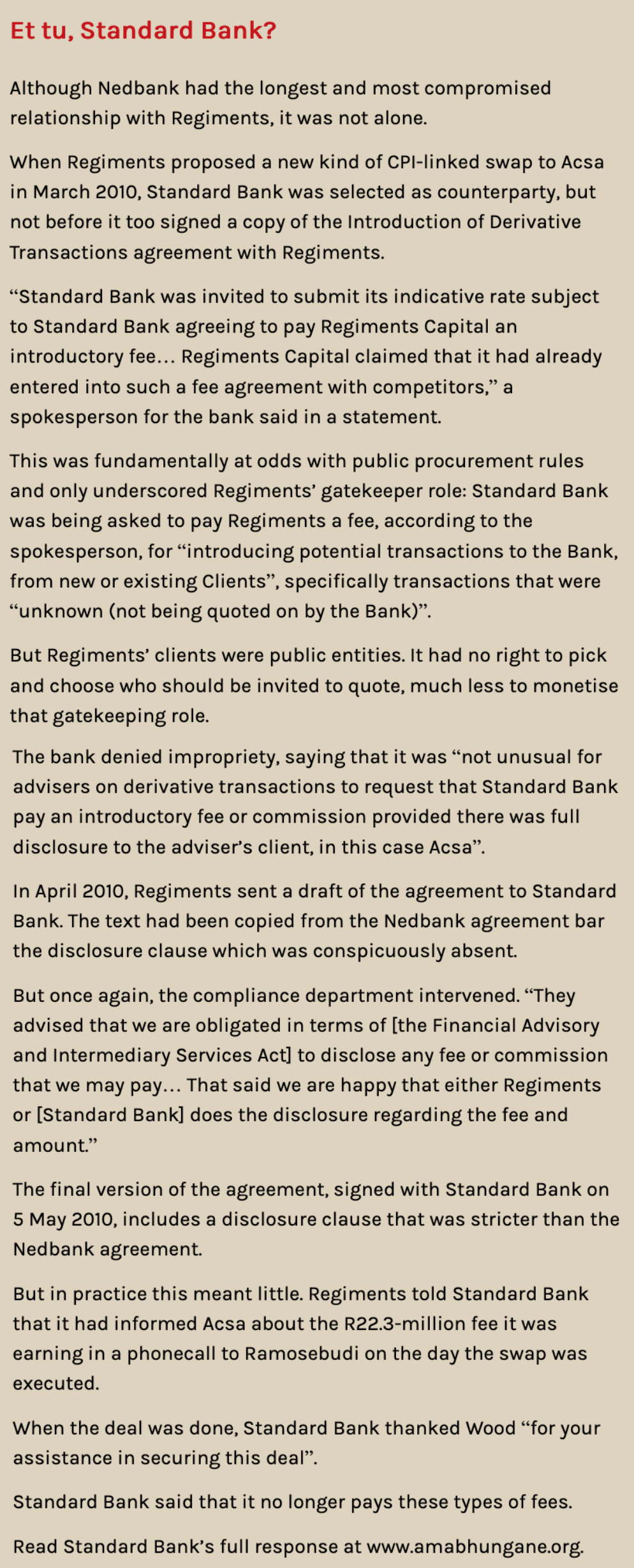
Read full response here.
But by now, the fees were so massive that Nedbank wanted to be sure someone at Acsa knew.
“[I]t was this evolution of us saying that we want to make sure that the SOEs are aware of the fees. We know that Regiments has an obligation to disclose, but we would like to see that as well,” Bosman told us.
“[Y]ou can see that initially we didn’t necessarily ask for it, but there were internal discussions; two people actually went to see Eric [Wood].”
After that meeting, Wood asked Ramosebudi to confirm in an email to Nedbank that he had been told about Regiments’ fees. He obliged, thanking Regiments for its transparency. That he was only informed about the fees in a telephone call on the day the swaps were traded, or even days later when it was too late to object, did not seem to bother him – or Nedbank.
What the banks did not know was that Ramosebudi had reason to play ball.
Six days after signing off on the second CPI-linked swap, Ramosebudi used his private email account to send seven invoices to Regiments; they included everything from “actuarial and risk management consulting” (R400,000 excl VAT) to “liquor and catering” (R293,313).
These covert invoices would continue to arrive throughout 2010 and 2011, some with cover emails from Ramosebudi that requested Wood’s “review and comment” on research reports that, when opened, turned out to be more invoices.
In total, Regiments paid R5.2-million to Ramosebudi’s companies.
When amaBhungane first exposed the apparent kickbacks to the former treasurer in 2018, he claimed it was unfair to expect him to remember that far back. When the Zondo Commission asked the same questions, he said: “Chairperson … may I reserve my rights not to respond to this one in case I incriminate myself?”
The R1-billion bad bet
Ultimately, Regiments’ gamble went horribly wrong. The “why” strays into technical territory, but basically the CPI-linked swaps failed to meet the criteria for hedge accounting, something which Regiments and Ramosebudi probably should have checked.
This slip-up created “extreme volatility” on Acsa’s income statement and after just one year, Acsa wanted out. But there was a problem: Nedbank informed Acsa that it would cost R856-million to unwind the swaps and undo the damage that Regiments had caused.
This would have been a good time for Nedbank to cut ties with Regiments. The advisers had led Acsa into two ruinous swaps, incentivised by the enormous fees it earned through Introduction of Derivative Transactions. But instead of terminating its agreement, Nedbank chose to keep profiting from Regiments’ influence.
Sensing another opportunity, Nedbank offered to take over the swaps and refinance the Acsa loans a different way. Nedbank offered Regiments an additional 24 basis points fee (R34-million) if Acsa accepted.
Among internal emails we found a memo “prepared by Phetolo Ramosebudi” which provided a long list of advantages that Nedbank’s proposed structure would offer. The metadata of the document and the email it was attached to show the document was actually authored by Regiments’ Wood.
But by this point, Acsa appears to have run out of patience. In its 2012 annual report, it disclosed that it had paid R919-million – R494-million to Nedbank and R425-million to Standard Bank – to unwind the swaps.
In other words, Acsa had paid almost R1-billion to put its interest rate exposure back to where it started two years earlier.
In contrast, Regiments had already received R22.3-million from Standard Bank and would continue to earn fees from the Nedbank leg of the disastrous swaps even after they were unwound.
The version of Introduction of Derivative Transactions that Nedbank had signed, allowed it to claw back the fees paid to Regiments if the swaps were unwound. But for whatever reason, Nedbank declined to ask for its money back. The final portion of Regiments’ R19.5-million fee was scheduled to be paid by Nedbank last year.
Acsa told amaBhungane it is “reviewing current litigation, procurement matters, the status of previous forensic reports and other governance-related issues”, including the swaps.
“One objective … is to identify and address issues similar to … those that have plagued state-owned companies over a number of years… Acsa accepts that it is likely that it, too, has been a victim of unethical and possibly illegal conduct.”
But Acsa also told us that it was hamstrung by a lack of information, both from former employees and the banks.
“[I]t appears to us that you, and probably the banks concerned, are in possession of considerably more information than exists in Acsa’s records…
“Acsa engaged Nedbank in 2018 with a view to obtaining additional details of the agreements entered into. The level of detail that has since been shared with amaBhungane was not shared with Acsa.”
The PR crisis over political exposure
The Nedbank-Regiments party almost came to an abrupt end when, in September 2012, amaBhungane started publishing a series of articles about Regiments, its ANC links, its role in the politically-connected Capitec empowerment deal and its contract to manage the City of Johannesburg sinking fund.
Emails show Regiments director Niven Pillay proposed a media “blitzkrieg”, which included hiring people to defend Regiments in the comments section of the Mail & Guardian’s website – although the public relations firm that Regiments hired assured us that this last part was never implemented.
“Overall, if we stage a blitzkrieg, we can kill this issue within a week or two. It requires major prep and then a media saturation over a few days,” Pillay wrote to his Regiments colleagues.
But the articles stirred something inside Nedbank. Emails between Wood and Brickman show that the bank finally started wondering whether it wanted to be in business with Regiments at all.
There is a hint of panic in Wood’s emails from this period as he begged Nedbank not to cut ties with his firm: “Regiments have had a close relationship with the Nedbank group since inception of our company… We have tried wherever possible to steer business towards the Nedbank group,” he wrote in a November 2012 email to Brickman.
“Whilst we understand the reputational risk posed to Nedbank by the recent negative media attention on Regiments, we feel that we have gone above and beyond in the level of transparency shown to the media and yourselves.”
Wood continued, “Please may I request that an unemotional review of the facts take place within Nedbank in order for us to resume our relationship. Regiments have worked hard over the years to foster a relationship of trust and integrity with Nedbank, which we feel that your team continue to place in question notwithstanding the openness with which we have responded.”
Unfortunately, this is where our access to their communications goes dark. We do not know what happened inside Nedbank, but we suspect that Nedbank took the allegations seriously because two weeks later, Brickman got an irate letter from the City of Johannesburg demanding to know why Nedbank had suspended the city’s trading lines “without any consultation”, based on media allegations.
Whatever Regiments and the city did, something worked because by December 2012, Regiments and Nedbank were back in business.
Another R30m from City of Tshwane
Earlier that year, the City of Tshwane had hired Mathamela, the former Johannesburg treasurer we read about above, and his company Pro-Grace to advise on restructuring the city’s long-term debt.
With Regiments’ help, Pro-Grace had come up with an ambitious plan to restructure R5-billion in loans. Their fee would be R524,000. But the real windfall would come from implementing the strategy they created.
The city had been quite clear in its written mandate that implementing the restructuring plan “will not incur any additional fees” beyond the R524,000 it had already paid.
Mathamela told us via his lawyers that it “became clear that Pro-Grace would have to continue … on risk as the [city] remained intent on not remunerating Pro-Grace for this phase as well… The [city’s] position was that Pro-Grace would recover its cost and fees via the savings that would materialise … through the restructuring exercise”.
In other words, if the advisers wanted a fee, they would have to get it from the banks.
As Regiments had done before, it asked Nedbank to add between 9 and 58 basis points to the interest rate on each new loan as “our fee”.
But there was a problem: the Nedbank executive arranging the loans was seemingly unaware of this long-standing arrangement.
“There is a great deal of sensitivity with regards the transparency of intermediary fees and this should remain a discussion between yourselves and the city,” Vusi Mpofu told Mathamela and Wood in a December 2012 email.
Brickman, who was copied on the email, wrote back assuring his colleague that “[t]he city has agreed both to the amount of the fees and to them being recovered in the pricing of the transactions” and that this “has been done in the past with other such transactions”.
But Remo Moyo, another Nedbank executive, agreed with Mpofu: “The fees arrangement between yourselves (the advisers) and your client is a process outside our involvement… Guided by our internal policies we are unable to pay commissions of which the proposed arrangement would be tantamount to the same.”
Changing the rules of the game
When we interviewed Nedbank in 2018, the bank’s executives characterised the fees paid to Regiments in terms of the Introduction of Derivative Transactions agreement not as an introduction fee, but as an advisory fee that the client had approved and asked Nedbank to include in the all-in rate.
“[W]e were merely facilitating the payment of the fee… [We] see it as an advice fee,” the bank told us.
There is little evidence to support this claim. The wording of the agreement is clear: “If Regiments introduces the Client to Nedbank Capital and provides advice to Clients with the result that Nedbank Capital entered into the Transaction … Regiments will receive a fee”.
And a report from Transnet’s attorneys notes that, when interviewed in 2019, “Nedbank confirmed that it had an agreement with Regiments, in which it would pay Regiments a fee/commission for any business it brings.”
But by the end of 2012, the way that Nedbank paid Regiments its fees was evolving. And there were times when public sector clients consented to Regiments getting a fee from the bank rather than paying Regiments directly from the public purse.
This appears to be the case with the City of Tshwane.
Regiments director Niven Pillay would later tell a client that it is “very common” for advisors’ fees to be wrapped into the all-in rate: “The reason for this is that the client doesn’t need to raise the fees in order to pay it.”
But this method also meant that without going through a competitive bidding process, Regiments was able to turn a modest R524,000 advisory contract into a money-spinner that would quietly siphon millions from the City of Tshwane over a 10-year period.
For restructuring two loans and executing an interest rate swap on a third loan, Nedbank agreed to pay Regiments and Pro-Grace R30,6-million, which would be recovered from the city by increasing the interest rates the city paid. At Nedbank’s request, city officials confirmed they were aware of the arrangement.
“We … confirm that the City will not pay for your fees directly and that your fees will form part of the all in swap rate and paid to you by the executing bank,” city manager Jason Ngobeni wrote in an email to Mathamela.
This was a ham-fisted solution and one that lacked the transparency and fair play that should be present whenever a municipality spends public money. There would be no tender, no line-item in the city’s books disclosing that R30,6-million would be paid in advisory fees to Regiments over the next 10 years.
At Mathamela’s request, Nedbank had agreed to divert the entire fee to Regiments. “[ProGrace] is comfortable that it will collect its share of the fees from Regiments as and when due,” he told Brickman in a January 2013 letter.
This time, when Regiments delivered its invoices to Nedbank, it did not mention the Introduction of Derivative Transactions agreement; instead, under “services rendered” it merely said “margin … as per agreed schedule”.
Nedbank has continued to pay these fees, funded by the City of Tshwane, ever since. The final portion is due to be paid to Regiments in March 2023.
RMB, which Regiments also approached to take over some of the loans, was a different story.
The bank declined to sign a copy of the Introduction of Derivative Transactions agreement but initially agreed to pay Regiments and Pro-Grace a R10,7-million “arranging fee” on Tshwane’s behalf, which would be rolled into the interest rate on two new loans.
But days before the deal was finalised, RMB backed out of paying the fee, citing “administrative and compliance issues”.
Unlike Acsa, the City of Tshwane would profit from the loans and subsequent swaps that Regiments and Pro-Grace put in place.
“In early 2014, there was a spike in long-term interest rates … which resulted in some of the swaps going deep in the money creating an opportunity for the city,” a spokesperson said in a statement. In this instance, the city was able to “exploit the market conditions … to generate liquidity for the City”.
Transnet would not be so lucky. As it had already done with Acsa and the City of Tshwane, Regiments would roll the dice on interest rates. The loss could run into billions.
The dream team
This brings us back to where we started this story. Remember Mathane Makgatho, the Transnet treasurer? For two years, she had held off an onslaught from key State Capture players. But by 2015, she had had enough.
One of the last things she said to her staff before resigning was: “I arrived here with integrity and I will leave with my integrity intact.”
This provided an opening for Ramosebudi who was quickly appointed to succeed her as Transnet treasurer. It also provided an opportunity for Regiments and Nedbank.
As treasurer, Makgatho had been unwilling to entertain the fanciful proposals from Wood and Brickman. She was told that her complaint to Nedbank Capital had led to Brickman being “reprimanded”. But the bank had taken no steps to keep him away from future Transnet business. And once Makgatho was out of the way, Regiments – assisted by Nedbank – made its play.
A year earlier, in 2014, Transnet had signed historic contracts to acquire 1 064 new locomotives.
To help finance this, Transnet turned to a consortium of banks – Nedbank and its associated financial services firms Old Mutual and Futuregrowth included – for a R12-billion “club loan”.
But before the agreement was even signed, Regiments approached Nedbank to switch the interest rate on the club loan from floating to fixed.
This instant swap went against Transnet’s financial risk management framework which says that, where possible, a loan should be taken with the appropriate interest rate in place: “The preferred option will be to enter into a loan with the fix/floating characteristics as required,” it reads, noting that interest rate risk hedges could be introduced later if “markets or trends have changed”.
Entering into interest rate swaps only days later did not meet this definition.
As we saw earlier, when Regiments proposed an instant swap at Acsa in 2009, a senior Nedbank executive had tried to intervene, fearing Regiments was taking its client for a ride. The Transnet swap not only featured the same cast – Ramosebudi, Wood and Brickman – but also the same doubtful commercial rationale.
But this time Nedbank would raise no objection.
Nedbank ducked responsibility in its statement to us, saying: “As a general rule, Banks cannot be seen to be interfering with the management of their clients. Given that Nedbank was not an adviser to the clients regarding the derivative transactions referred to, Nedbank was not and is not in a position to challenge the commercial objectives of our clients.”
Financial choreography
Under normal circumstances, Transnet’s world-class treasury team would have approached various banks and asked for competitive rates for the swap, a process that would normally take weeks.
But December 2015, at the height of State Capture, was anything but normal. Acting with unexplained urgency, Regiments hand-picked Nedbank to act as counterparty-cum-middleman on a series of swaps for a R4,5-billion tranche of the club loan.
It was an unusual arrangement: Nedbank would act as Transnet’s counterparty, swapping the latter’s existing floating rate for a fixed interest rate of 11.83%; but Nedbank would also enter into a series of mirror swaps with the Transnet Second Defined Benefit Fund, a Transnet pension fund, providing a floating rate in exchange for a fixed rate of 11.65%.
The difference – 18 basis points – would accrue to Nedbank for acting as “credit intermediary”, a role with virtually no risk but that would generate, by our calculation, R74,2-million over the life of the loan.
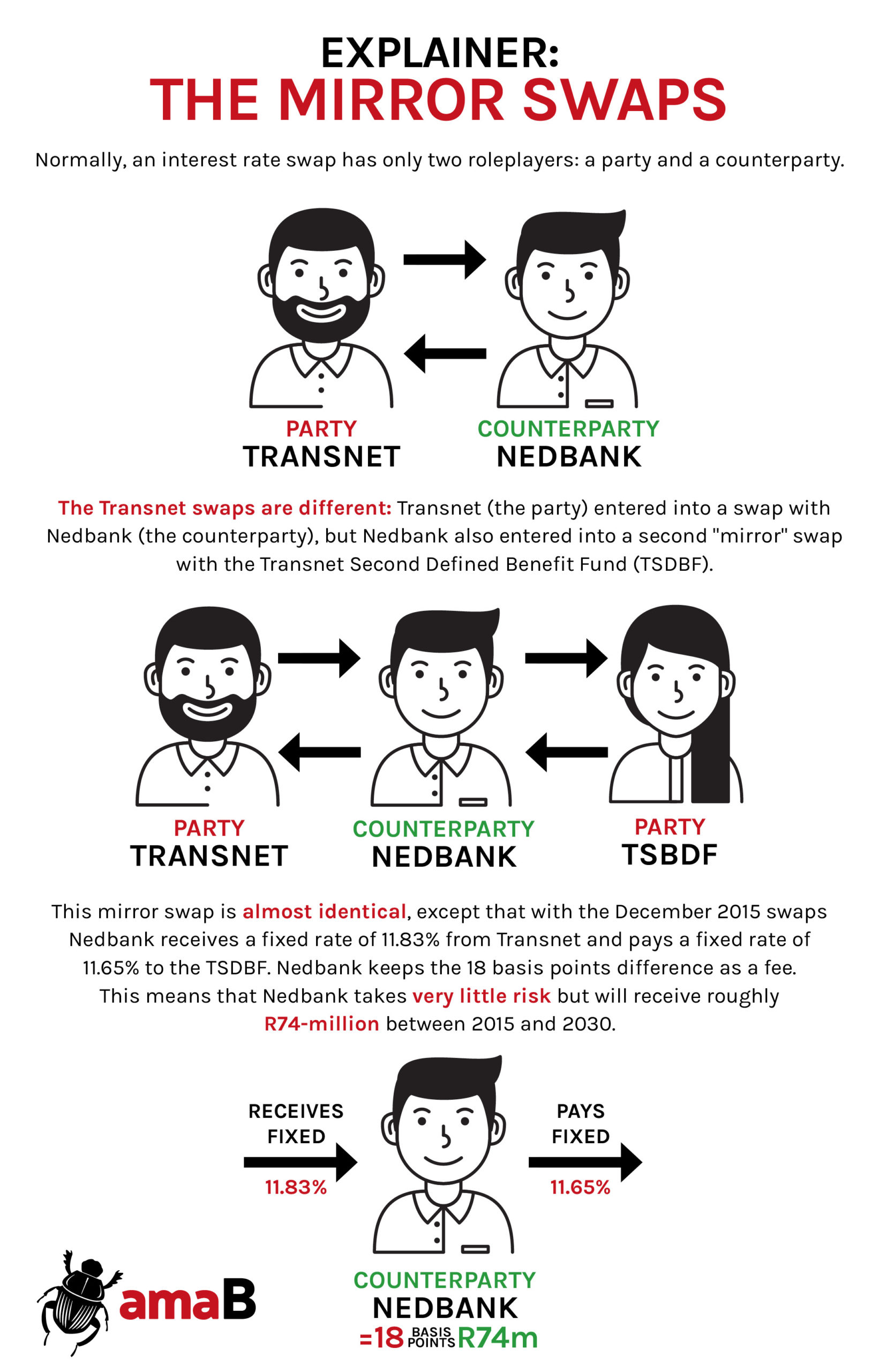
As far as we can tell, this unusual structure was designed to get around the problems created by Transnet entering into interest rate swaps with a related party, i.e. its own pension fund.
Nedbank’s presence, effectively as cardboard cutout, would not meaningfully solve the related-party problem, but would paper over it for appearance’s sake.
Nedbank later told Transnet’s attorneys that Regiments – which conveniently was also in charge of managing the pension fund’s investments – had once again dictated the interest rates that each party would pay and receive.
And again Regiments, and specifically Wood, was on both sides of the transaction: as adviser to Transnet and fund manager to the Transnet Second Defined Benefit Fund.
Somehow, none of this seemed to bother Nedbank.
The sleight of hand
Regiments, of course, was not planning on working pro-bono.
Although Transnet had already paid Regiments R189-million for advising on the 1,064 locomotive funding plan and paid another R93,5-million to the Regiments spin-off Trillian for raising the club loan, Ramosebudi proposed that Transnet award Regiments a 20 basis points fee for arranging this series of interest rate swaps, once again without a tender.
Although this would add just 0.2% to the interest rate that Transnet would pay – a seemingly insignificant amount – it would by our calculation entitle Regiments to R82,5-million over the lifetime of the loans.
But by now, Nedbank had cold feet and no longer wanted to act as postman by delivering the fee to Regiments.
“[I]n the beginning of 2015, there was a decision that we will not pay commissions on behalf of any clients to any advisors. No matter who the adviser was,” Ferreira told us. “In those types of deals … the clients must pay their commission to their own advisers.”
Bosman added: “[O]ver the years … banks became more wary of fees and third parties. So, by 2015, we were not paying Regiments directly at all.”
But, with Nedbank’s connivance or not, how Regiments got paid involved a sleight of hand: No fee was paid by Nedbank to Regiments directly, but Regiments’ 20 basis point fee was included in the interest rate passed on from Transnet, via Nedbank, to the pension fund.
Once the 20 basis points was there, Regiments Fund Managers could transfer the money out using its unrestricted access to the pension fund’s bank account.
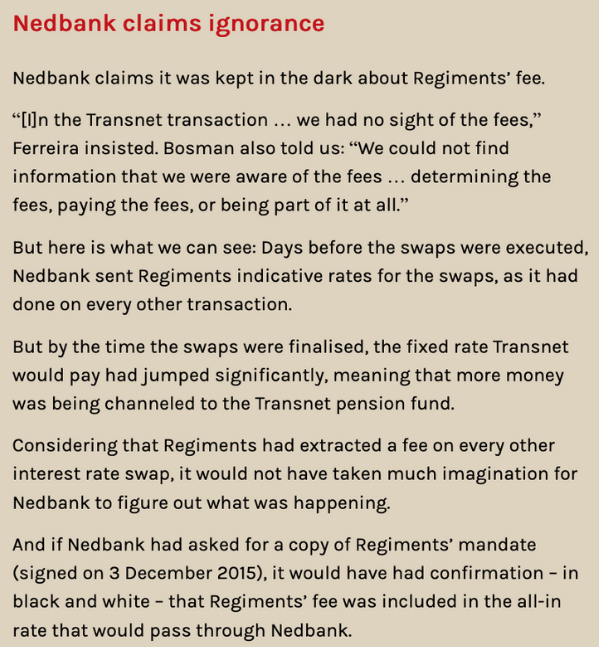
The table was now set: Regiments would be on both sides of the deal – as Transnet’s advisers and managers of the Transnet pension fund – and both Regiments and Nedbank would collect a generous fee.
The only people not invited to the feast was the Transnet treasury team.
‘I need to sort this out’
It was highly irregular for the dealing room at Transnet’s treasury to be locked out of discussions about how to manage Transnet’s interest rate exposure.
The four-man team had 85 years’ experience dealing in derivatives and helped run one of the most sophisticated treasury functions in the country. Plus, Transnet had a whole host of policies and memos underscoring that treasury work had to be done in-house, where expertise existed.
Yet the dealing room was told to sit aside while Regiments ran the show.
On 2 December 2015, Ramosebudi’s deputy, Danie Smit, almost derailed the transaction when he sent out a memo arguing against the swaps.
Ramosebudi was not pleased.
“I went to Mr Ramosebudi’s office … and he was very upset with me,” Smit would later write in an affidavit.
“Mr Ramosebudi did not look up to me when he was talking… The discussion was short… I can unfortunately not remember any further detail apart from Mr Ramosebudi’s face expression of his dissatisfaction that he was not comfortable with the memorandum I mailed.”
Unbeknownst to Smit, his boss had already forwarded Smit’s memo to Wood with a note that read: “I need to sort this one out.”
Soon, Ramosebudi sent back a revised memo. The table Smit had included to show that interest rates were not forecast to spiral out of control – and therefore did not require an expensive hedge – was now used to reach the opposite conclusion.
“The short-term interest rates are expected to increase over the medium period, the [sic] poses a serious risk to Transnet debt portfolio,” the revised memo read.
The new conclusion: Transnet should enter into the swaps after all. Problem solved.
On 4 December 2015, Regiments committed Transnet to pay a fixed interest rate of 11.83% on the R4,5-billion portion of the club loan until December 2030.
Ignoring a May Day’s parade of red flags, Nedbank executed its side of the deal.
Currently these interest rate swaps are deep in the red for Transnet. The difference between the floating rate Transnet receives and the 11.83% fixed rate it pays is a yawning 5.6%; a loss of almost R200-million over the past year.
Former Transnet chief financial officer Mohammed Mahomedy told the Zondo Commission in 2019 that in his view Transnet had been “successfully manipulated” by corrupt executives and complicit consultants who used financial instruments such as interest rate swaps to “siphon” billions of rands out of Transnet.
“The … use of complex financial instruments … hid flows to beneficiaries and created annuity losses for state entities.”
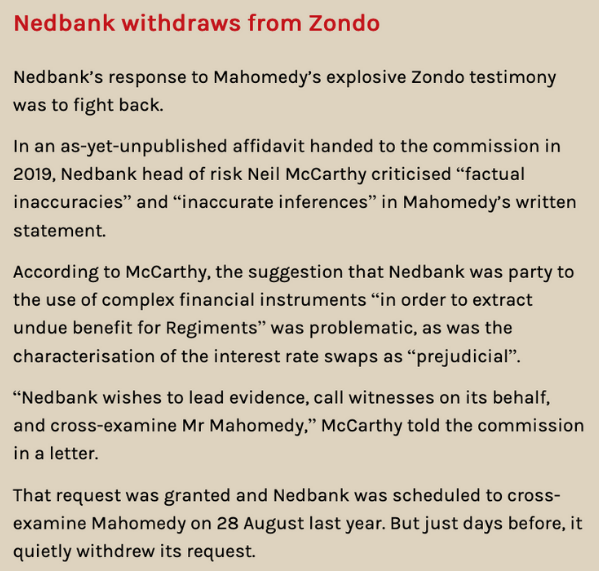
The main beneficiary of this “annuity loss” should be the Transnet pension fund, given that the floating rate it got turned out to be the winning bet. And of course Regiments, whose margin of 20 basis points would have produced an estimated R82,5-million in fees over the lifetime of the loan, which runs until 2030; although Regiments elected to take a discounted R56,7-million in cash immediately.
‘Day one loss of R400-million’
Soon, Transnet – guided by Wood – was in the market for additional interest rate swaps on the remaining R7,5-billion of the club loan and Nedbank was once again tapped for the job.
On 7 March 2016, Nedbank initiated five swaps, planning to saddle Transnet with a fixed interest rate of 12.37%, way above the Jibar-linked floating rate of 9.7% Transnet was paying at that stage.
Nedbank would again stand in the middle with the Transnet Second Defined Benefit Fund on the other side. For its largely risk-free efforts, the bank was to take the 17 basis points difference between the Transnet and Transnet pension fund interest rates.
But this time, Transnet’s neglected treasury team was ready to intervene before the trades could be confirmed.
On 10 March, Transnet’s chief trader, Reon Louw, emailed Ramosebudi drawing his attention to the fact that the Nedbank price was way above what was available in the market: “The mid swap rate as calculated by us indicates a rate of 11.50. Nedbank’s rate [of 12.37%] is 87 bps above mid. The 87bps equates to a negative present value (i.e. day one loss of R400mill, which will impact the income statement)… Are you happy to proceed on the above basis?”
It was unusual for an interest rate swap to be so badly underwater on day one. But Wood, with Nedbank’s help, was about to commit Transnet to paying this obscenely high interest rate for the next 15 years.
A few days later, the treasury team tried again, sending Ramosebudi competitive rates from two other banks, HSBC and Absa. In every category they were cheaper than Nedbank.
But no one was listening.
Ramosebudi forwarded the treasury team’s email to Regiments and when no reply was forthcoming, sent another email saying: “Transnet will confirm the current transaction in spite of the fact we have raised concerns.”
As a minor concession, Regiments reduced Transnet’s fixed interest rate from 12.37% to 12.27%.
Nedbank knew that the rate Transnet would pay was higher than what was available in the market, and that questions might be asked.
In an email to Ramosebudi, Brickman wrote: “[O]ur compliance is requesting a letter that essentially states that Transnet has looked at the transaction and the rates concluded and that Transnet is satisfied with the pricing and value of the transaction.”
To make Ramosebudi’s life easier, he proposed wording to the effect that Transnet was “aware and agreed” to paying “over mid-market value”.
Ramosebudi obliged, as he had done at Acsa, copying Brickman’s suggestion word for word.
Nedbank’s 17 basis points fee, for acting as middleman on this second series of swaps, will have generated an estimated R117,1-million by the time they terminate in 2030. Regiments would have received R137,7-million over the same period but, as it had done before, opted to take a smaller up-front fee of R63,9-million.
In total, these lightning-fast swaps in December 2015 and March 2016 will, by our calculation, generate R191,3-million in fees for Nedbank between 2015 and 2030. Regiments could have walked away with even more – R220,2-million in fees – but opted for the two amounts of cash upfront totalling R120,6-million.
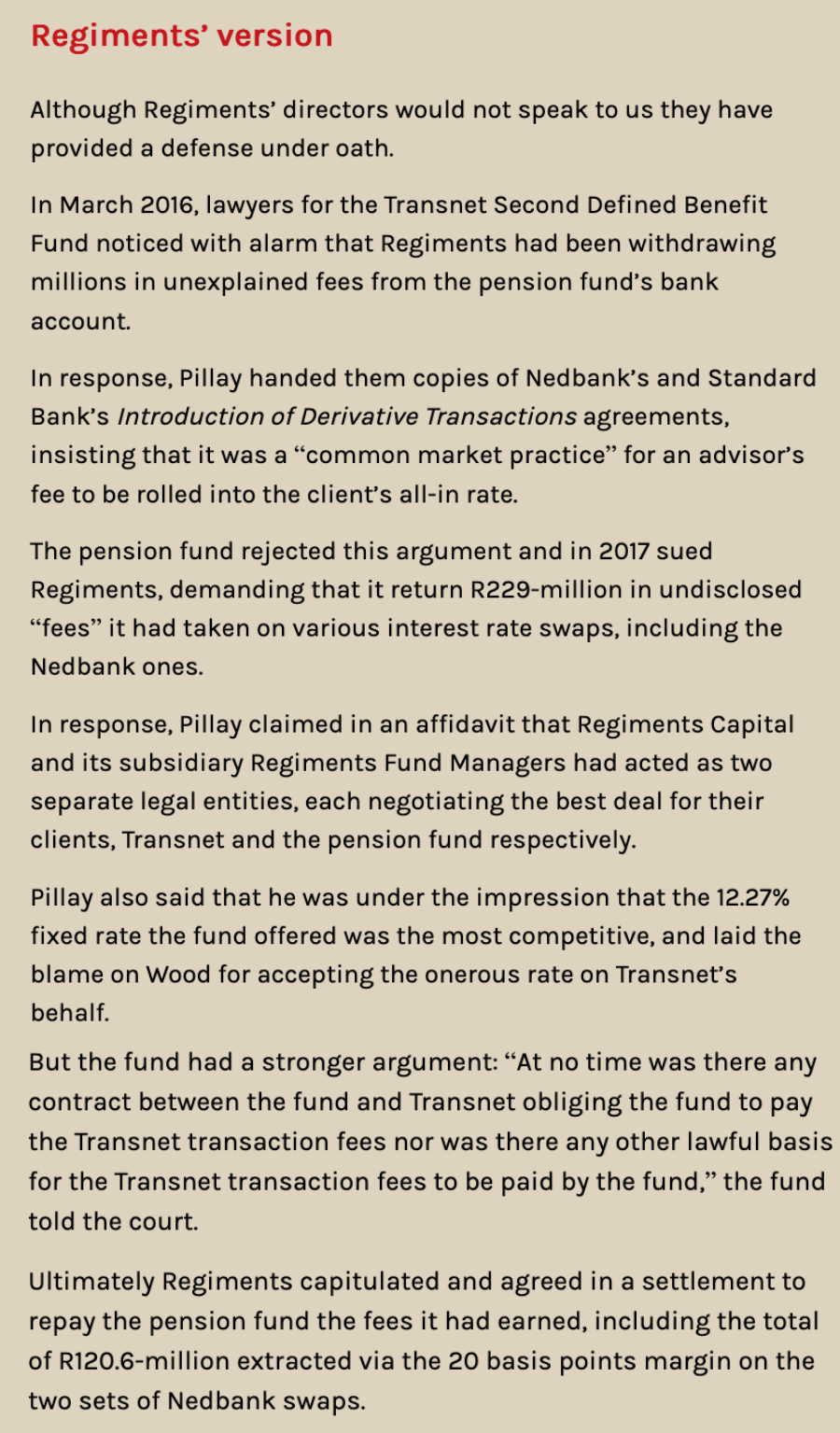
Nedbank backs away
By the time the second Transnet swaps were concluded in March 2016, it was hard to ignore the information emerging about Regiments, the Guptas, then president Jacob Zuma and State Capture.
On 9 December 2015, just days after the first Transnet swaps, Zuma fired Nhlanhla Nene as finance minister and replaced him with Des van Rooyen (who brought with him a special adviser, Mohamed Bobat, until then a senior figure at Regiments).
The Van Rooyen appointment spooked the markets and the ANC. Zuma was forced to backtrack and install Pravin Gordhan.
Around the same time, the Guptas pulled off a year-long coup to acquire Optimum coal mine from Glencore. What no one knew was that most of Regiments’ fee from interest rate swaps would immediately be transferred to companies linked to Gupta business partner Salim Essa from where, it is alleged, the money would be used to help pay for Optimum.
This may explain why Regiments opted for the smaller, up-front fee that it could get its hands on immediately. It may also explain why Regiments pushed so relentlessly for the interest rate swaps to go ahead.
While Nedbank was in the dark about Regiments’ links to the Guptas, it had ample evidence that Regiments and Ramosebudi were taking Transnet for a ride.
The interest rates that Transnet had agreed to pay made no commercial sense. And once again, the flurry of swaps seemed designed to generate extra fees for Regiments.
In March 2016, after the swaps on the R12-billion club loan, Regiments offered Nedbank another Transnet swap, but this time the bank declined, explaining that its risk department had “concerns”.
As far as we know, the March 2016 swaps were the last major deal between the two. However, when we interviewed Nedbank in 2018, it confirmed that “contractual payments” on “historical deals” – such as Acsa and City of Tshwane – were still taking place.
Counting the cost
Nedbank said in its statement to us that it considered the fees it will receive from the Transnet swaps – by our calculation R191,3-million – to be “fair, reasonable and appropriate for the risks involved”.
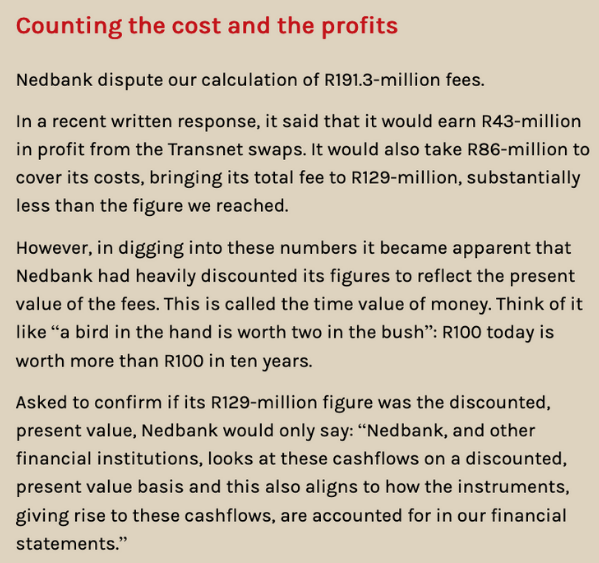
It also maintained that it conducted its derivatives business in an “ethical and transparent manner” that “strictly adhered” to legislative and governance requirements.
Last year, Transnet hired MNS Attorneys to review the interest rate swaps and calculate the losses incurred through the 11.83% and 12.27% fixed rates it agreed to pay on the R4,5-billion and R7,5-billion portions of the club loan respectively until 2030.
The attorneys’ report calculated that by February 2019, the interest rate swaps that Nedbank facilitated had cost Transnet R1,7-billion in realised and unrealised losses. To put that into perspective, that is more than Transnet spent on maintenance in its past financial year.
But since then, the floating interest rate on the deal has dropped to 6.3%. And Transnet, which is stuck paying a fixed rate of up to 12.27%, has been forced to fund the difference.
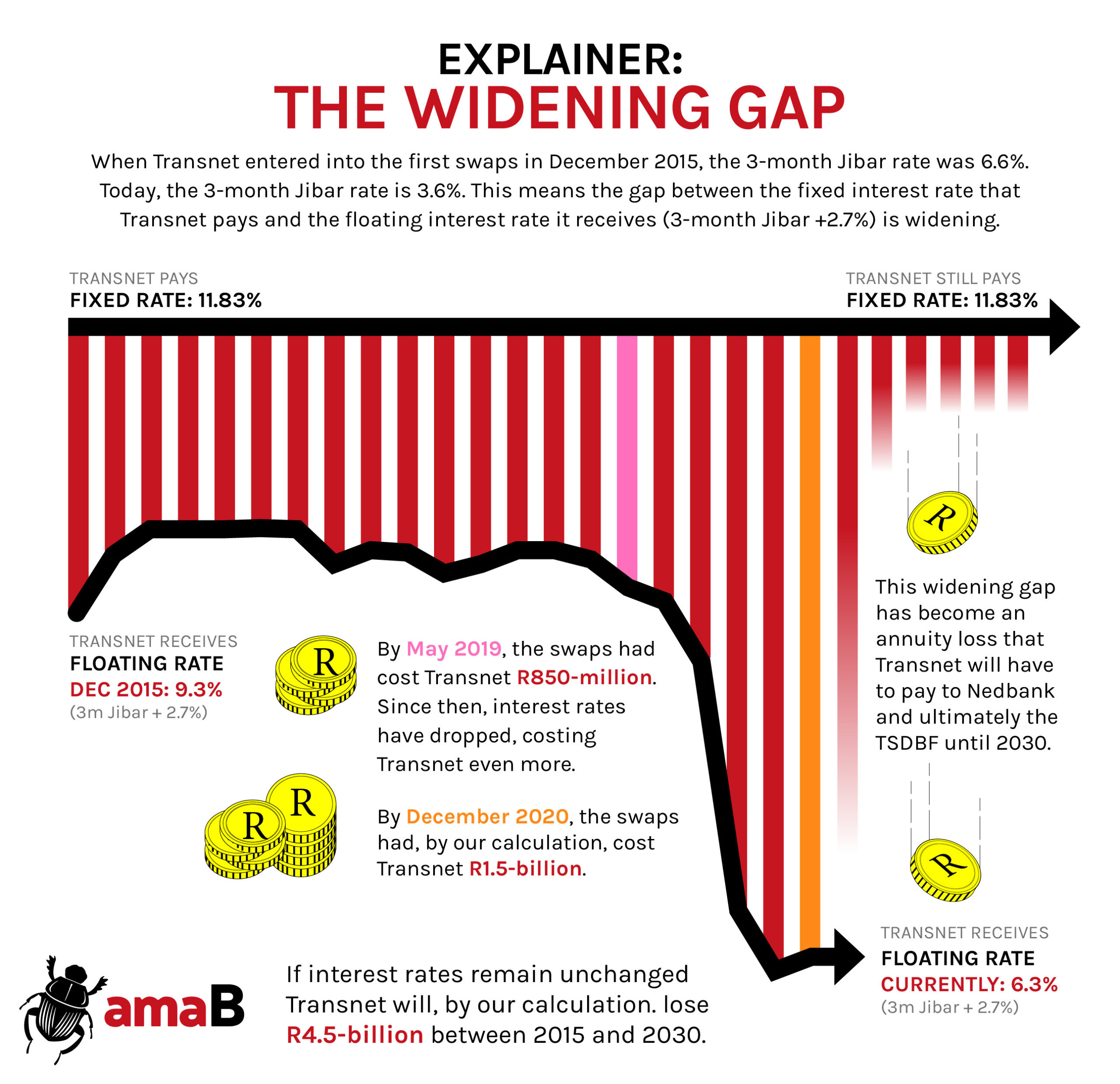
It is difficult to predict how interest rates will move in the future, but if they remain at current levels, Transnet will have paid away R4,5-billion by the time the swaps expire in 2030 – unless it takes action.
The chickens come home to roost
In its 2019 report, MNS Attorneys told Transnet: “The decision to conclude the swaps was irrational and irregular. Transnet should approach a court to have the interest rate swaps reviewed and set aside; and/or refuse to perform and to resist attempts to enforce the interest rate swaps.”
So far Transnet has not done this, choosing instead to negotiate with Nedbank.
But in these negotiations, it is understood Nedbank has insisted that the only way out of the swaps is for Transnet to pay the market value, just like Acsa did in 2012 when it paid Nedbank almost half a billion rand to unwind a bad swap.
Except this time, the loans are much bigger and the interest rates much further apart.
Transnet would not comment on the negotiations, but said in a brief statement: “Transnet … remains intent on stopping and recovering losses. The interest rate swap between Transnet, Regiments and Nedbank forms part of investigations currently under way by law enforcement authorities and the [Zondo] Commission… Out of respect for these processes, Transnet is not in a position to provide any detailed responses until the investigations are concluded.”
Nedbank maintained that it was cooperating with Transnet, the Special Investigating Unit and the Zondo Commission: “We reiterate that Nedbank has a zero tolerance for corruption… Nedbank supports and will continue to cooperate with relevant authorities in their quest to bring the purveyors of corruption to book.”
Yet these words do not sit well in the bank’s mouth. In response to one more set of questions from us, Nedbank itself offered a neat summary of the case against it:
“In our view, the substance of your questions can be summarised into the following central issues and allegations:
- That Nedbank was aware, or should have been aware, that Regiments misled its clients in relation to the fees it earned from the transactions in question;
- that Nedbank was complicit in enabling Regiments to extract excessive fees from its clients in that Regiments proposed transactions which were not in its clients’ interests and Nedbank failed to advise the clients of this; and
- that Nedbank incentivised Regiments to propose such transactions by entering into the Introduction of Derivative Transactions agreement.”
In response (in full below) the bank denied it was complicit in any alleged scheme by Regiments to defraud its clients or to extract undue benefit from them.
Nedbank’s defense is essentially that state-owned entities and municipalities are big boys and girls, “sophisticated entities” that can look after themselves.
“[W]e rely on their directors, office bearers and financial control structures to manage their own internal affairs and to ensure that their governance responsibilities are adhered to.”
The bank also argued again that since it was not the adviser to these clients, “Nedbank was not, and is not in a position to challenge the commercial objectives of these clients” and that it was Regiments’ responsibility to tell its client about the extra fees it earned.
This ignores three factors.
One, it ignores the reality that by paying commissions to Regiments – which was the adviser – Nedbank incentivised it to act against the clients’ best interests.
Two, it rarely took any steps to ensure the clients knew of this side arrangement which bled millions from scarce public funds.
And three, even when Nedbank was merely facilitating the payment of the client’s fee, Nedbank had good reason to suspect that rules were being bent and broken for Regiments’ benefit.
By March 2016, when Nedbank received a letter from Ramosebudi confirming “that Transnet is satisfied with the pricing and value” of a transaction that would result in it suffering an immediate R400-million loss in book value, there were already allegations that Transnet had been captured by interests aligned to the Gupta family.
Further, Nedbank knew from Acsa how unreliable Ramosebudi was as a guarantor of probity and good sense. Yet Nedbank agreed to play a part in the scheme.
What the narrative we have set out demonstrates, in our view, is that Nedbank came to exercise a willful blindness.
Some of its senior employees had first-hand knowledge of Regiments’ duplicity. In other instances, the cumulative evidence of Regiments manipulation of its clients was overwhelming.
For seven years Nedbank reaped the profits of its mutually beneficial relationship with Regiments. Now it may be time for Nedbank to reap the whirlwind. DM
Nedbank responds
Nedbank asked that we publish this statement in full:
Nedbank has at no time acted unlawfully or improperly in its dealings with Regiments and the affected counterparties; or Regiments clients. Nedbank denies any inference or accusation that it was complicit in any alleged scheme by Regiments to defraud its clients or to extract undue benefit from them.
The Corporate and Investment Banking clients of Nedbank are sophisticated entities and we correctly rely on the legislative framework regulating the banking and financial services sector as well as the financial conduct of public entities. In addition, we rely on their directors, office bearers and financial control structures to manage their own internal affairs and to ensure that their governance responsibilities are adhered to. Given that Nedbank was not an adviser to the affected Regiments clients regarding the transactions referred to, Nedbank was not, and is not in a position to challenge the commercial objectives of these clients.
The Introduction of Derivatives Transactions agreement was concluded on 25 May 2009 between Nedbank Capital (as it then was) and Regiments Capital on the express premise, and documented as such, that:
- Regiments undertook to disclose to its clients that it would receive a fee from Nedbank Capital, which would be included in the pricing agreed between Nedbank Capital and the client; and
- Regiments confirmed that it was not acting as Nedbank Capital’s agent.
There was nothing unlawful or unusual about the agreement which Nedbank had entered into, on the understanding that Regiments would adhere to its terms, coupled with its obligations as a registered Financial Services Provider (‘FSP’). Regiments was obliged to comply with the Financial Advisory and Intermediary Services Act and General Code of Conduct for FSPs which, inter alia, required of it to disclose its fees to its clients and to avoid conflicts of interest.
If Regiments failed in its obligation to make full and proper disclosure to its clients and or otherwise engaged in improper or unlawful conduct, Nedbank cannot be held accountable for this.
Nedbank was not aware at the time of entering into any of the transactions in question of any associated unlawful or corrupt conduct by Regiments. Nedbank denies that it was complicit with reference to any such unlawful or corrupt conduct that may have been perpetrated by Regiments and others.
Nedbank’s activities are conducted in an ethical and transparent manner for the benefit of our clients and stakeholders. All Nedbank’s client relationships are subject to the Financial Intelligence Centre Act, governance and regulatory reporting requirements, to which we strictly adhere.
We reiterate that Nedbank has a zero tolerance for corruption, and we expect all of our stakeholders, including our clients, service providers and staff to conduct themselves in an ethical manner and with corresponding integrity.
Nedbank is supporting, and will continue to support and cooperate with, the relevant authorities. DM


















 Become an Insider
Become an Insider
Just like many ANC and Public Enterprises accused and compromised executives/board members, Nedbank plays the same game. Denials, denials, denials
This is a seriously brilliant piece of investigative journalism, tackling a very complex subject. It is praiseworthy that such abuse is brought to light by journalists, which otherwise would be forgotten or more likely never exposed. The tragedy is that none of the parties will be had up, sent to jail or chastened. If any action was taken the guilty parties (if proven to be corrupt) would very satisfactorily just pay their way out of it.
I absolutely agree Bridget! Superb journalistic work by Susan Comrie and Sam Sole. Congratulations and well done to the two of you.
Well said Bridget, but ‘brilliant’ is an understatement.
There have always been accusations that WMC capital innuendos are not exposed. This is a good report to highlight the shenanigans, in particular, involving this once Afrikaaner bank.
Keep up the good work.
As was the case with the various other corrupt deals (SAP Germany, McKinsey, EOH, China Rail, etc), one hopes Nedbank will eventually be shamed into saying we did not know but as gesture we forfeit all funds earned. This investigation (applause) will cause the bank harm not only in corporate banking market but even down to retail level. Step up ladies and gentleman and do the right thing, even if you admit no fault!
This article is, like so many others before it, damning of the abuse of BBEE by gangsters installed by Zuma and the ANC in every nook and cranny of the SOE’s and big business in the form of the willfully blind Nedbank. I didn’t think I had the capacity to feel sick while reading yet another State Capture article, but this proved me wrong.
This is superb investigative reporting. Mathane Makgatho stands out as a beacon of integrity in a sea of corruption. Many of those who have been very critical of the Zuma kleptocracy and his various enablers and who have complained about a lack of action from the current administration can now finally act themselves by closing their Nedbank accounts and insisting that the bank pays back the money.
It’s telling that RMB stepped back from this hot mess before it committed itself, even though it was offered the same game-plan. Wow. Contrast this to last week’s, “the [former] president did nothing wrong.” The NPA must be deeply indebted to Sam Sole and Amabhungane. We all are.
Stupendous stuff. Now. Let’s have a little corporate accountability shall we and see which corporations, review this information, take it under advisement and then make a (public) decision about their choice of bankers?
Another masterful piece of investigative journalism by Amabhungane. Where would we be without them. I also worry about the fate of Mathane Makgatho who stood up for what was right. A number of whistle blowers have sadly seen their lives decimated because they stood up for right and have suffered with unemployment and basically treated as pariahs. The law has to change to ensure that they don’t suffer.
It’s also time that there is a major investigation into the actions of all the South African Banks and their involvement of Gupta and their associates’ funds.
As another reader said, when caught, the Banks appear to just hold up their hands and pay a fine [ it’s often included in their budgets].
I have always thought the banks are a cartel with only the interests of their shareholders at heart (of whom a not insignificant portion are the banks’ directors and senior management). Nedbank has a lot to answer for but will they? No bets on that one..
I firmly believe that the other banks were likely involved in similar shady deals. Remember, for a bribe to occur, it takes a briber and a bribee.
So much focus on government corruption, but let’s not forget that there are many companies who are themselves corrupt or enabling the government corruption.
Sadly, no consequences for any of them other than pay back the money or pay (a pittance of) a fine. These corporates should also be held accountable and their executives put in jail
Superb journalism. Corp SA i think has allot to answer. They never seem to complain about the Gov excess debts, bloated civil servant salaries etc. Corp SA could if they wanted, put pressure on the ANC to behave more ethically and be more accountable. But alas, we read and hear horror stories everyday. In this instance, Nedbank in my opinion should be charged with money laundering. Banks are cartels, and they make or break the economy. With impunity.